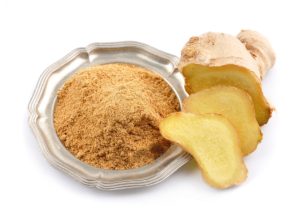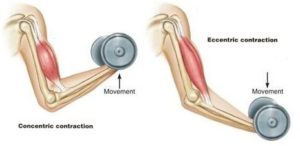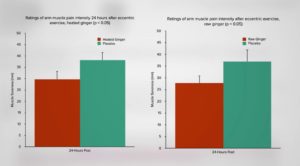
Anything that can help recovery from vigorous exercise is a good thing – well, so long as 1. it’s of natural origin, 2. has no negative side effects, and 3. won’t cost you an arm and a leg. Well, it appears that there’s another great gift for us from Nature’s bounty that satisfies all three criteria.
We’ve already looked at some of the evidence that a WFPB diet in general is ideal for preventing sports injuries 1 before you even start to exercise, as well as for improving general sports performance during activity and recovery afterwards 2 . But a 2010 study 3 demonstrated that ginger, the readily-available and cheap spice, is proven to be effective in reducing exercise-induced muscle pain. And here’s what the study reported…
Blog Contents
Ginger and rodents
Ginger had already been shown to exert anti-inflammatory 4 and hypoalgesic (pain-killing) 5 effects in rodents, but its effect on human muscle pain was uncertain before this 2010 study.
Ginger and human muscle pain
The research looked at the effects of 11 days of raw (study 1) and heat-treated (study 2) ginger supplementation on muscle pain. Raw ginger is the fresh rhizome and heat-treated is the dried powder that you usually buy in jars or packets. Both study 1 and 2 were identical double-blind, placebo controlled, randomised experiments with 34 and 40 volunteers, respectively.
The participants ate 2 grams (approximately a heaped teaspoon) of either raw (study 1) or heated (study 2) ginger or a placebo for 11 consecutive days.
They then performed 18 eccentric actions of the elbow flexors to induce pain and inflammation. The degree of pain was then measured and recorded – specifically, pain intensity, perceived effort, plasma prostaglandin E(2), arm volume, range-of-motion and isometric strength were assessed prior to and for 3 days after exercise.

Study results
As you will see from the chart below, the ginger (whether raw or dried) was better than the placebo at reducing the painful effects of exercise. The researchers concluded that “This study demonstrates that daily consumption of raw and heat-treated ginger resulted in moderate-to-large reductions in muscle pain following exercise-induced muscle injury. Our findings agree with those showing hypoalgesic effects of ginger in osteoarthritis patients and further demonstrate ginger’s effectiveness as a pain reliever.”

And even by 2010, there were already plenty of other studies 6 which had concluded favourably on the health benefits of ginger – from its anti-inflammatory and pain-killing features to its ability to lower blood sugar levels. This subject was also covered in a video 7 by Dr Greger.
Joe’s comment
It might be a good idea to get some dried or fresh ginger into your daily diet. I tend to add it to my list of ingredients in my huge breakfast8 muesli. There are some good recipe ideas on One Green Planet 9 although it’s strongly advised that you cut out the added salt, sugar and oils mentioned in some of the recipes.
References
- WFPB Eating to Prevent Sports Injuries [↩]
- Plant-Based Diet Improves All Aspects of Sports Performance & Recovery [↩]
- J Pain. 2010 Sep;11(9):894-903. doi: 10.1016/j.jpain.2009.12.013. Epub 2010 Apr 24. Ginger (Zingiber officinale) reduces muscle pain caused by eccentric exercise. Black CD, Herring MP, Hurley DJ, O’Connor PJ. [↩]
- Ojewole JA. Analgesic, antiinflammatory and hypoglycaemic effects of ethanol extract of Zingiber officinale (Roscoe) rhizomes (Zingiberaceae) in mice and rats. Phytother Res. 2006;20:764-772. [↩]
- Young HY, Luo YL, Cheng HY, Hsieh WC, Liao JC, Peng WH. Analgesic and antiinflammatory activities of [6]-gingerol. J Ethnopharmacol. 2005;96:207-210. [↩]
- Other pre-2010 studies into the health benefits of ginger: 1. Lantz RC, Chen GJ, Sarihan M, Solyom AM, Jolad SD, Timmermann BN. The effect of extracts from ginger rhizome on inflammatory mediator production. Phytomedicine. 2007;14:123-128. 2. Nurtjahja-Tjendraputra E, Ammit AJ, Roufogalis BD, Tran VH, Duke CC. Effective anti-platelet and COX-1 enzyme inhibitors from pungent constituents of
ginger. Thromb Res. 2003;111:259-265. 3. Tjendraputra E, Tran VH, Liu-Brennan D, Roufogalis BD, Duke CC. Effect of
ginger constituents and synthetic analogues on cyclooxygenase-2 enzyme in intact cells. Bioorg Chem. 2001;29:156-163. 4. Tripathi S, Bruch D, Kittur DS. Ginger extract inhibits LPS induced macrophage activation and function. BMC Complement Altern Med. 2008;8:1. 5. Grzanna R, Phan P, Polotsky A, Lindmark L, Frondoza CG. Ginger extract inhibits beta-amyloid peptide-induced cytokine and chemokine expression in cultured THP-1 monocytes. J Altern Complement Med. 2004;10:1009-1013. [↩] - Ground Ginger to Reduce Muscle Pain. Michael Greger M.D. FACLM July 27th, 2018 Volume 43 [↩]
- OATS WITH FRUIT, SEEDS AND NUTS [↩]
- 10 Amazing Ginger-Based Recipes! Onegreenplant.org [↩]